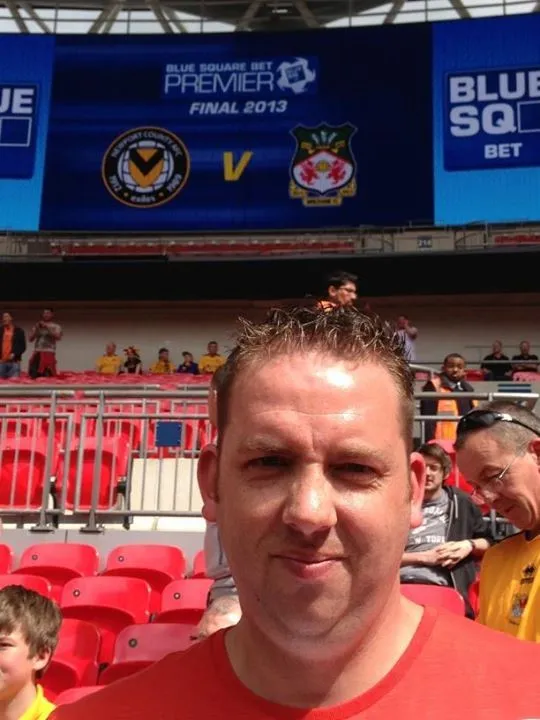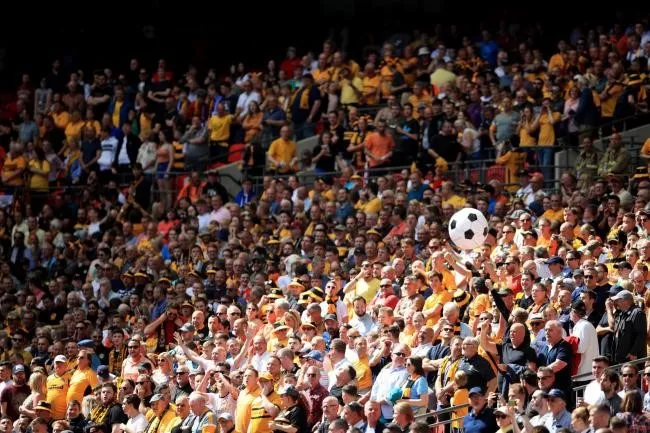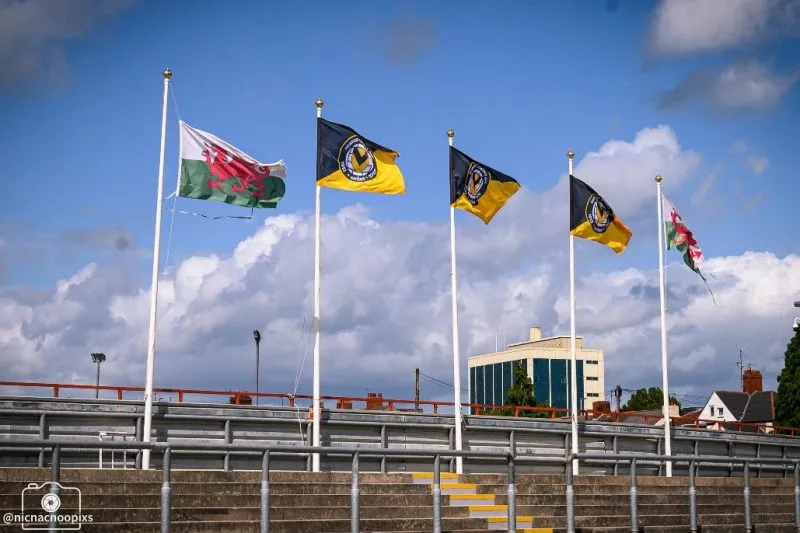This week is Mental Health Awareness Week, and up and down the country members of the public and people in high-profile positions are opening up to talk about their own mental health journeys.
Colin Faulkner is a Director at League 2’s Newport County. Colin has assisted the club to become one of the first EFL clubs to sign up to the Mental Health Charter for Sports & Recreation. The Charter sets out how sport and recreation organisations should adopt good mental health practice to make activities inclusive, positive and open to everyone.
Colin is also using this week to talk openly about his own personal experiences regarding his own mental health and he has kindly agreed for Level Playing Field to publish his first extract from his blog, Anxiety (Away).
Below is part one of Colin’s Anxiety (Away) blog. You can read Part two, three and four via the Newport County Website.
A word from Colin Faulkner:
Hello readers of Level Playing Field.
My name is Colin and I am a Director at Newport County. I feel now is the time to share my thoughts and personal experience regarding my mental health; not for people to feel sorry for me but rather to set an example as a Director of an EFL Club. My hope is that people associated with the club recognise our commitment and so they feel confident to start disclosing information in a safe, non-judgemental, environment but also that this can start happening across the country.

Everyone has their own issues and I appreciate they don’t feel able to articulate them in public, but after 3 years, I believe I can and this is the time to do so. I have called the blog “Anxiety (Away)”; it has two meanings. Firstly it relates to my mental health in relation to football, but also it’s how I’m telling it to go away on a daily basis.
Please share it yourselves, the more people it can reach the greater the chance of reaching those it can help. Thank you and I hope to see you all get back to your teams grounds once it’s safe for us all to do so. Until then stay well.
Anxiety (Away) – Part 1
There is a strong discourse about mental health in sport and particularly in professional football at this time of national crisis, but for it to truly be discussed openly it needs to start at the top of each football club. If chairs and directors are not creating a safe, confident environment to allow conversation on the topic, how can we expect our employees, staff and supporters to start opening up?
At a recent media event, three Premier League players were asked this question: “How often is mental health discussed at your football club?” The answer from all three was hardly ever, if at all. Ask the same question at Newport County AFC and the answer would be every week via a variety of official club channels. I have conversations nearly every day with people linked to the club on the subject and in relation to their own wellbeing.
It’s for these reasons that I have decided to record some thoughts on the topic via four daily blogs, including why it is an important subject to me, my own experience and some coping mechanisms I have used. We’re all different and so anything I say might not be the case for you, however I hope by opening up it will give others the courage to start talking themselves.
Why football is more than just a game
At this time of national crisis, the game is on hold and rightly so. The safety and health of people are more important than the on-field activities while we fight COVID19. However, the off-field part of the game is now getting the attention that most of us involved in the game in some part already knew about.
There is a lot in the media about such-and-such a player helping, or so-and-so club supporting their community. The truth is this happens every day across the industry. There are people whose lives function throughout the week revolving around match day and the socialisation and feeling of community that comes with that; the more you are involved with a club the more you see and understand it. It’s not just about those 90+ minutes on the field, it’s what is going on off it that is just as important.
The coronavirus virus is attacking us on two fronts: physically and mentally. While we can take steps to reduce the chance of contracting the virus, we cannot escape the threat to our mental wellbeing. I know there are supporters of our club who have reduced social contact outside of the football club. That may be due to physical restrictions or shyness, anxiety, PTSD and other socially debilitating issues that football allows them to overcome even if for a short period of time each week. The lockdown some of those people must adhere to for the health of their loved ones creates an immense amount of anxiety, worry and, if the situation continues into months, there is a very real possibility of depression.
Of course, during this pandemic it will be difficult if not impossible for those face-to-face services that vulnerable people rely on to function in a normal manner. Social media and telecommunications can help but I would suggest they don’t have the same impact in these cases. Our family has been on virtual lockdown since March 16th and I have not been outside of the immediate vicinity for the past week, the furthest was trip to the local supermarket 10 minutes from our house for essential items that were unavailable online.
The simple fact is that both myself and my middle son have a diagnosis that puts in the “vulnerable” category regarding the virus. I have managed a run round the local lakes a couple of times this week but that must be timed for that gap between morning dog walkers and those lunchtime ones to give me the best chance of social distancing. If I couldn’t go out for those half-hour runs, I would probably have lost my mind by now.
I am keeping in touch with people I am close with and checking in with people who are isolated or vulnerable but it’s not just for their benefit, it creates a distraction from time that I have to start thinking too much again and after less than 2 weeks I could feel my anxiety building again. The end game of this virus potentially brings forward the event that triggers my angst and I, like thousands of others in our community, need a distraction from that.
Anyone who travels to away games regularly will tell you it’s pretty much a whole day out in this country (certainly in League 2). I usually travel with a small group that often leaves Newport around 10am as we are required to be at the ground earlier than the majority of supporters and that travel time to and from games is often used to discuss things that come up during the week, often solving many of the problems we all face (in our minds anyway). It is accompanied with laughter and phone calls to people who haven’t travelled but provides an opportunity for us all to speak together and have a laugh.

This is a part of the football experience and cannot be replaced during this time of social distancing; consider those who travel on a supporter bus along with 40 other people at a time. Those journeys provide a crucial time of the week and an opportunity to exchange views, jokes and experiences with others on that bus knowing all of you have at least one thing in common. It is very rare, in my experience, that the day’s result (as a standalone score) has a considerable impact of the return journey.
The key talking points will be dissected with varying opinions shared but usually that feeling of community and togetherness takes over again with banter and laughter heard everywhere; even the journey back from Wembley last May was upbeat with the usual joking around taking place.

Home fixtures are similar as there will be people we all see regularly that are in the same area of the stadium as us but cannot travel for several different reasons. Turnstiles do not open until 1.30pm but some Bars open at 10am and do not close for until a long period after the final whistle. Supporters will gather to discuss the events of the week and have a drink with their mates, often leaving the ground to continue their socialisation and deconstructing what they have just witnessed.
During this time of seclusion most football clubs have acknowledged the situation that has developed, and continues to develop, and are taking steps to provide assistance in the impact on mental health in their communities. When I refer to community in this context it does not mean the geographical location and people who live around the club, but rather the supporters, staff and volunteers of that club who could live a good few hours away but on a weekly basis travel to see their team and mix with likeminded individuals. The EFL’s partnership with Mind has undoubtedly made an impact with this, providing access to information and support that may not have been readily accessible if it didn’t exist.
At Newport we are trying to reach out to people who are finding the quarantine period a struggle but we only know of a certain number of people that need support so I would urge anyone who is aware of others who are apart from the club for whatever reason to contact us and share contact details in order for us to help reduce anxiety. One thing is for sure; when we come out the other side of this we will have a new-found appreciation of the game we love and those people that stand with us shoulder-to-shoulder each week.
Until that time, it is the responsibility of all of us to look after each other.
We depend on our NHS staff at this time as we look to them to guide us to the other side of this pandemic, but we need to remember they will be not only physically worn out, but mentally too.
In the words of a former talk show host; “Look after yourself, and each other”.
Written by Colin Faulkner, Director at Newport County AFC – all views are Colin’s.
